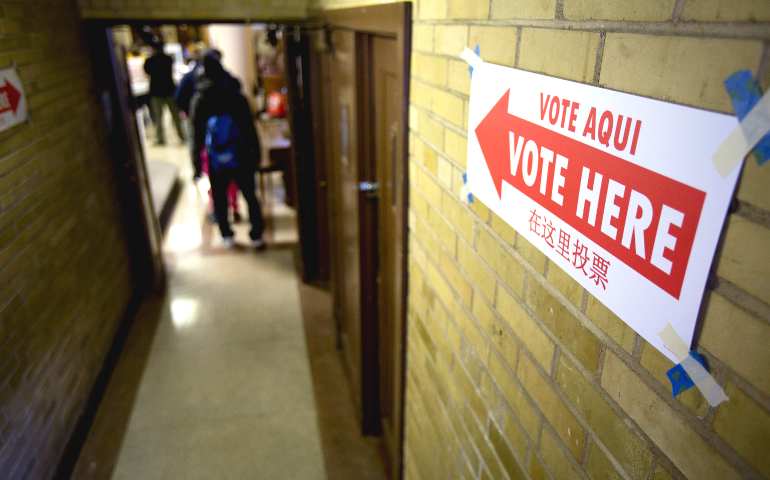
Voters enter the John Bailey Room at St. Francis Xavier Church in Washington Nov. 8. (CNS/Tyler Orsburn)
A strong white evangelical, Catholic and Mormon vote for Donald Trump belied the condemnation many religious leaders had leveled at the tycoon and paved the way for a stunning upset after a long and polarizing campaign.
Preliminary exit polls indicate these religious groups voted for Trump by strong margins — in some cases larger than they had given to Republican presidential nominee Mitt Romney in 2012.
Christians who described themselves as evangelical and born-again gave Trump 81 percent of their votes, up 3 percentage points from their support for Romney. Democratic presidential nominee Hillary Clinton garnered 16 percent of their votes.
"Donald Trump made the most full-throated and aggressive appeal to evangelical voters ... since Ronald Reagan spoke to the Religious Roundtable in August of 1980," said Ralph Reed, chairman of the Faith & Freedom Coalition. "He made these voters of faith a centerpiece of his campaign."
Evangelical support for Trump surged even as prominent evangelicals, including Southern Baptist Russell Moore, railed against Trump's behavior toward immigrants, women and other groups as un-Christian.
Trump never cast himself as a particularly religious person. And Clinton made her commitment to her Methodist faith known on the campaign trail.
But no one should be surprised by evangelicals' turnout for Trump, said Robert P. Jones, CEO of PRRI.
"White evangelicals in this election aren't values voters. They're nostalgia voters," he said. "Trump's line — 'Let's make America great again' — and his last-minute saying — 'Look, folks, I'm your last chance' — was really powerful for white evangelicals who see their numbers in the general population slipping.
"White Christians are declining every year by a percentage point or more as a proportion of the population," Jones added. "So when Trump says, 'I'm your last chance, folks,' there's a real truth to that."
White Catholics favored Trump, 60 percent to 37 percent.
Latino Catholics went for Clinton over Trump, 67 percent to 26 percent. Trump had lambasted the criminals and "rapists" among Mexican immigrants, promised to force Mexico to pay for a wall he would build on America's southern border, and denigrated a judge because of his Latino parentage.
Perhaps there was a little more Latino support for Trump than expected, said Greg Smith, associate research director at the Pew Research Center. But otherwise, he said, the divided Catholic vote — between whites and Latinos — split as earlier polls had predicted.
"Talk about a 'Catholic vote' as a whole can obscure as much as it reveals because there are identifiable subgroups of Catholics who tend to vote in particular ways, and that is exactly what we saw in this election," he said.
Catholics in general voted for Trump over Clinton 52 percent to 45 percent. That's despite Pope Francis and other prominent Catholics' rebuke of the candidate for railing against immigrants and other minority groups.
White Catholics in both 2012 and 2016 went for the GOP candidate, their support for Trump this year just over the 59 percent they gave to Romney.* And while Latinos in both elections threw their support behind the Democrat, their support for Clinton trailed the 75 percent they gave to President Barack Obama four years ago.
The Mormon vote, the most important in overwhelmingly Republican Utah — where more than 60 percent of people belong to the Church of Jesus Christ of Latter-day Saints — gave Trump an easy win in the state.
Trump won 46 percent of Utah votes, compared with Clinton's 27 percent. Independent Evan McMullin won 21 percent.
Prominent Mormon politicians in the state — including Gov. Gary Herbert, Rep. Jason Chaffetz and former Gov. Jon Huntsman — had expressed outrage at Trump after a video released last month revealed the candidate's lewd comments about assaulting women.
Given Mormons' reputation for clean living and their embrace of traditional values, there was even some talk in the past few weeks about the red state turning blue, or at least purple.
But the backlash against Trump did not benefit Clinton. Anti-Trump votes instead seemed to gravitate to McMullin, who is Mormon.
The statistics for mainline Protestants make drawing meaningful conclusions difficult. Available exit polling data, compiled by a firm hired by a consortium of major national news organizations, does not break down the group by race — an important factor in analyzing the vote.
The Jewish vote in this presidential election looked much as it did in the past, with overwhelming support for the Democrat: Clinton garnered 71 percent compared with Trump's 24 percent. That compared to 69 percent for Obama and 30 percent for Romney in 2012, and 78 percent for Obama and 22 percent for rival John McCain in 2008.
Do not hold your breath for statistics on the Muslim vote in 2016.
Though the Muslim population of the nation is growing, and despite robust get-out-the-vote efforts among Muslim Americans, they still represent less than 1 percent of the electorate. That's too little, pollsters say, to collect enough data to draw conclusions about their voting patterns.
[Lauren Markoe has been a national reporter for RNS since 2011. Previously, she covered government and politics as a daily reporter at the Charlotte Observer and The State (Columbia, S.C.).]
*An earlier version of this article made an incorrect comparison.